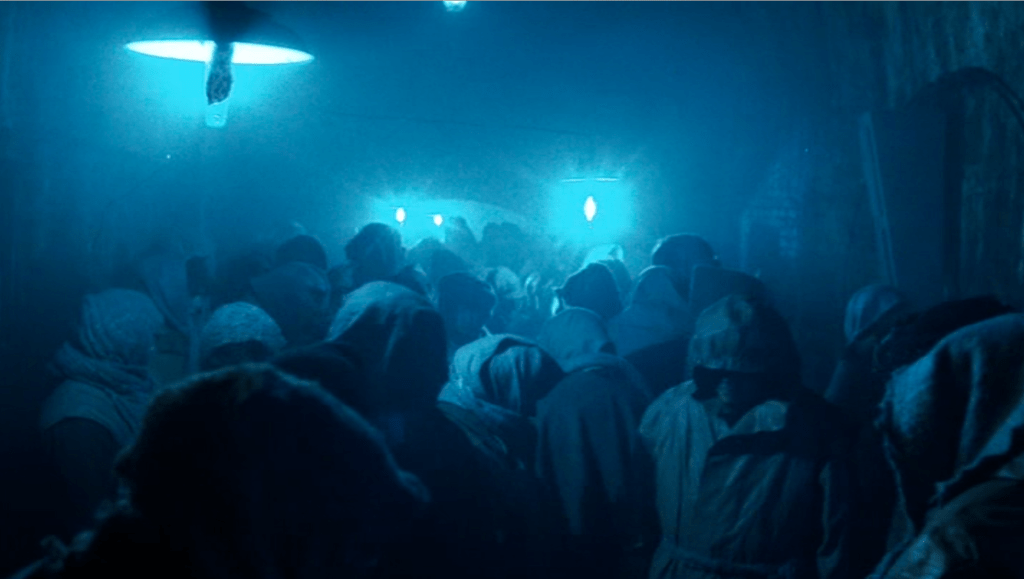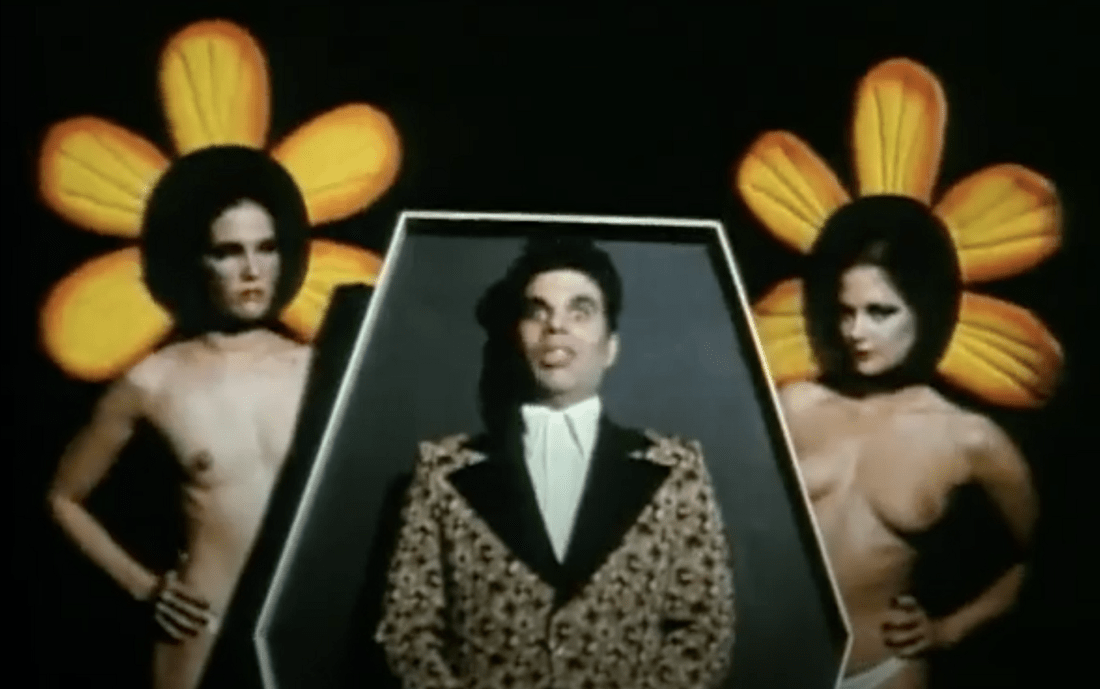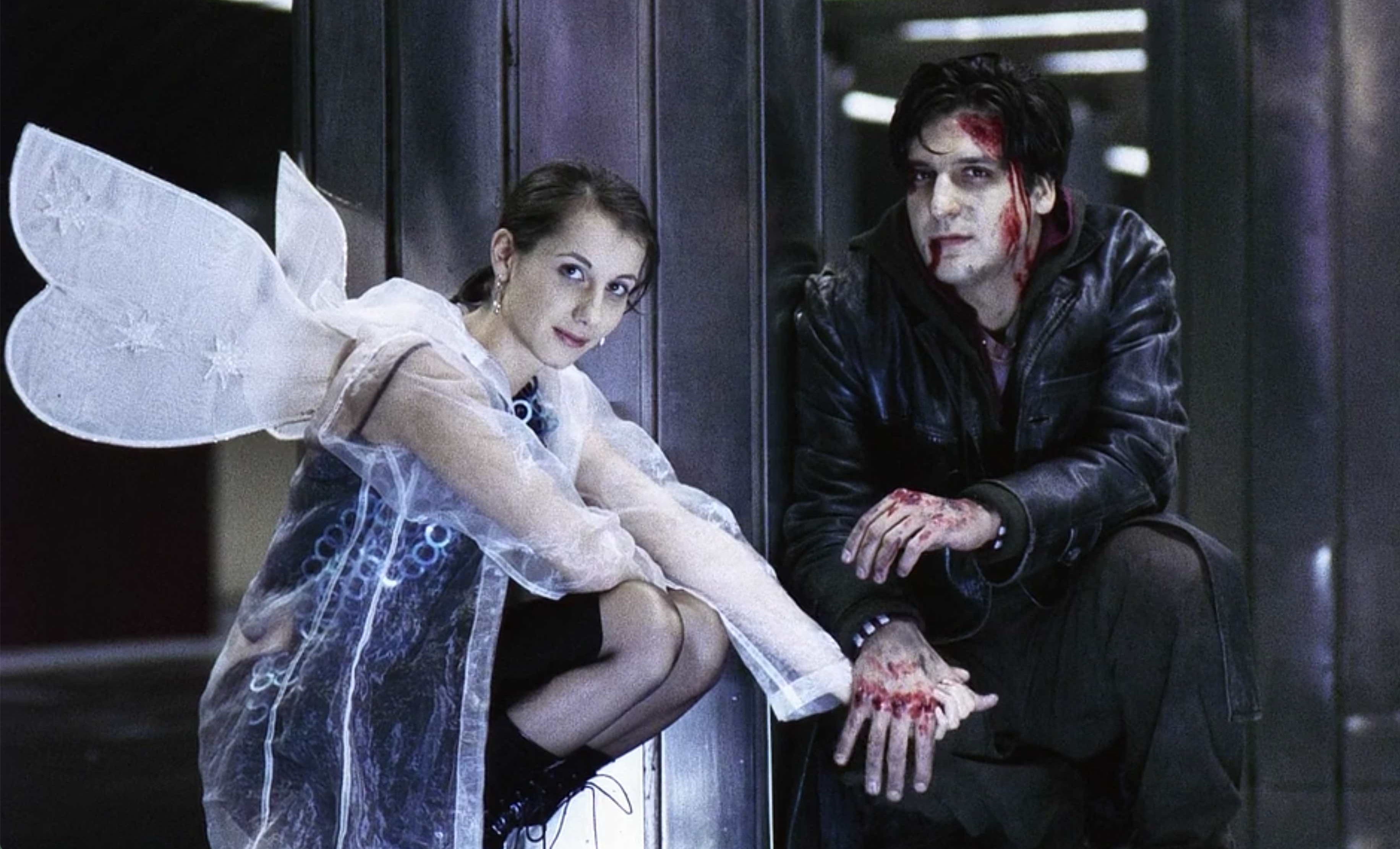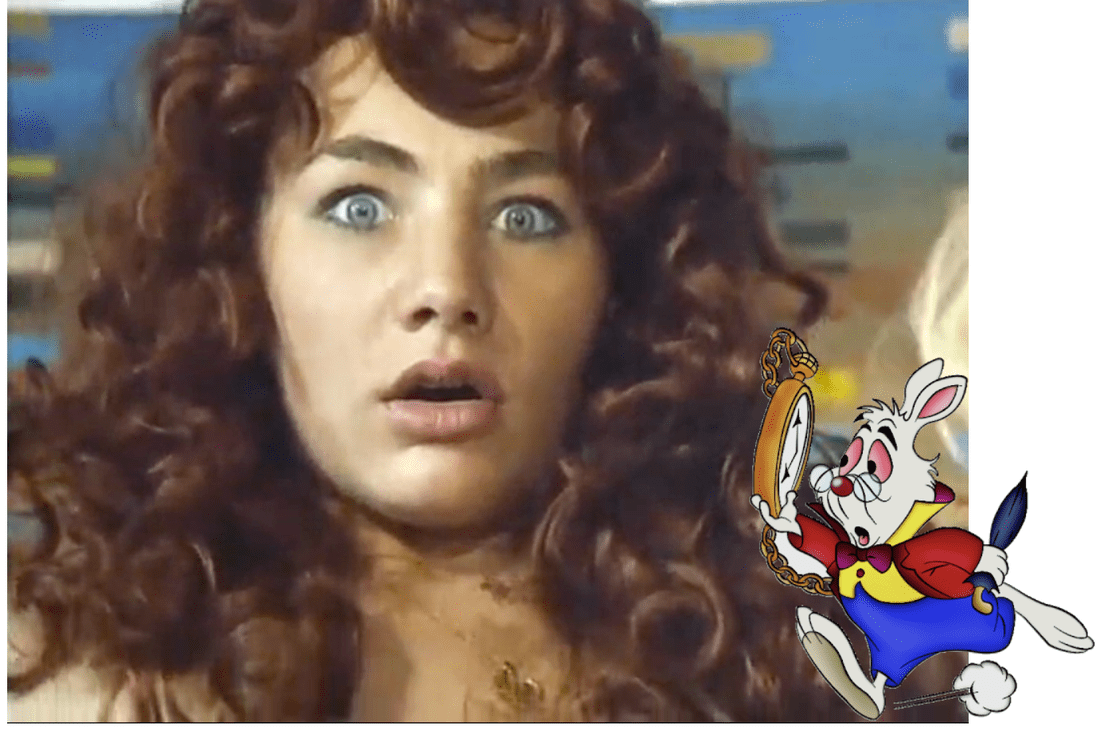
There is far too much for me to unpack in O-Bi O-Ba The End Of Civilization and if it is to be unpacked I am not the right one for the job. The film is Polish and although I am in fact 1/4 Polish I certainly don’t know enough about Polish history or politics to fully explore all the messages and meanings in this very dense film. However, I recognize and understand enough to fuel this attempt at engaging with it.
O-Bi O-Ba The End Of Civilization is an ugly film, a really ugly film. It is shot in a dark series of catacombs or bunkers and uses a lot of blue bare bulbs as its light source. Everyone is either backlit into silhouette or blown out by overexposed flare. Some chambers in the complex are slightly better than others but the film is unrelenting in its use of harsh light as a means of washing away anything aesthetically pleasing.
Essentially O-Bi O-Ba The End Of Civilization deals with hope. It examines not only how hope functions on a personal, human level, but how it functions as a political and social tool. This is not the dreamy optimistic hope of Hollywood or Christianity, it is a torturous and complex emotion that can drag you to ruin.
Spoilers Ahead (kind of)
O-Bi O-Ba The End Of Civilization was written and directed by Polish director Piotr Szulkin in 1985. It stars Jerzy Stuhr who was made famous for his work with Krzysztof Kieślowski on films like Camera Buff and Decalog. O-Bi O-Ba The End Of Civilization is pretty brutal. It is in fact about the end of civilization. We get to witness it, but instead of humanity trying to escape their final demise, or indulge in one last hug, the hopeful rabble charge toward oblivion mistaking it for salvation. It’s a rough ending to swallow.
Jerzy Stuhr plays a government official named Soft. There isn’t really a functioning government but there is a small group of men who have convinced themselves that they are in charge. They seem to be the only ones who are fully awake and aware. The rest of what is left of humanity just aimlessly wanders the halls of the underground bunker slowly starving to death or losing their minds. They are an aimless, sickly horde that just clogs the hallways swaying back and forth with their heads down.

Somewhere is a chamber where a librarian dissolves all the books that remain into a cellulose powder and then sprays it down on the crowd for them to eat. It is reminiscent of Russian author Mikhail Bakhtin. Bakhtin was trapped indoors during the German invasion and so used the pages of the only manuscript of his book as cigarette papers. Day by day he smoked them until the book was completely gone, perhaps in an exercise of pragmatism over hope.

Szulkin’s unwashed masses live under some kind of protective dome that is on the verge of collapse and it is Soft’s job to find the engineer who made the dome and get him to repair it. When Soft finds the engineer, the engineer has no interest in repairing it. He has lost all hope and is calmly resigned to letting the dome collapse facilitating not only his suicide but his part in the ending of the human race.
Szulkin presents hope as something of a vulnerability. Hope makes you weak and fearful and therefore open to manipulation. It is a kind of Nietzschean view where hope is the last resort of the coward. Instead of facing reality, or what needs to be done, the hopeful invest their energy in passive prayer or optimism. Szulkin makes a point of developing and emphasizing this idea but he also recognizes that hope is necessary. We, the audience, are frustrated by the engineer’s resignation. He has lost all hope and with it all motivation to act.
Soft’s job is to manage morale, which is not easy when all that is left of humanity is 1000 people hiding in the darkness of a bunker. At some point in the past, the “government” tried to control the rabble by offering them an inspiring lie. They told them that there was an enormous ark coming to rescue them. The idea was to promote hope, but it backfired. It brought an end to any efforts to make life better. People simply hunkered down and waited.
The surviving masses use small metal chits for money. They call them Arks, as if hope is something you can monetize, traffic in, and exchange. As with all money, the little chits are physically worthless and become valuable only when people agree that they are. It is a form of faith and/or hope that keeps the monetary system working.
Of course, all of this is a metaphor for the tragic failures of communism. The dream of equality, plenty, and freedom ended up a sad mirage, but Szulkin’s film is not limited to one interpretation. There is the larger issue of why we pursue utopias in the first place. Szulkin recognizes the value of dreaming about the future but in the film, it always leads to something horrible.

One of the rabble has secretly constructed a bunker within the bunker that will withstand the collapse of the dome. He brings Soft in and offers to allow Soft to hide with him when the end comes. Excited the man shows Soft all his preparations until Soft uncovers a glass tank where the man has frozen two naked prostitutes in preparation for the future. He explains that on the ark they will probably have the technology to thaw them out safely.
The poor man has been perverted by hope. If a magic ark is going to save us all, why not believe it can make every dream come true. Szulkin is not just talking about Communist idealism but religion as well. If you are going to start down the path of believing in talking snakes and a magic man in the sky, what is to stop you from losing all touch with reality?
In her essay On the Benefits of Hopelessness Pema Chodron, a prominent Tibetan Buddhist, addresses the effects of hope and belief in god.
“Theism is a deeply seated conviction that there’s some hand to hold: if we just do the right things, someone will appreciate us and take care of us. It means thinking there’s always going to be a babysitter available when we need one. We all are inclined to abdicate our responsibilities and delegate our authority to something outside ourselves.”
As long as we’re addicted to hope, we feel that we can tone our experience down or liven it up or change it somehow, and we continue to suffer a lot. In a nontheistic state of mind, abandoning hope is an affirmation, the beginning of the beginning. “

Chodron has a stark but firmly positive approach to hope. Szulkin is more undecided. In a scene where Soft is reporting to his superior, they argue over why the engineer refuses to repair the dome and save mankind.
Soft: “But he believes that his decision agrees with the faith of those 2000 people who have come here.”
Leader: “What decision and what faith?"
Soft: “What faith?! The escape into a myth, the escape from, reality, the Ark faith.”
Leader: “There are now not more than 850 people left alive. The remainder have died of cold, dirt and malnutrition. For none of them even thinks of flushing up the jakes after crapping”
Faith and shit, that about sums it up. We have the capacity for abstract constructions that we can use to inspire, delude, enlighten or demean but we all have to deal with the corporeal reality of our existence.
Soft ends up trying to find a replacement for the Ark fantasy. He is hoping to inspire the people and through them the listless engineer. As in Orwell’s 1984 Soft tries to unite them against a common fictional enemy. In 1984 it was Eurasia, in O-Bi O-Ba it's the evil Booroos, but this doesn’t work. Then he discovers a new source of hope. There is a rumor that somewhere in the complex is an airplane, but instead of telling everyone and reigniting their hopes, he keeps it a secret. His search for hope has become personal, but the plane turns out to be an empty, useless hulk, and Soft goes on a frantic search for something else. He finds a child he hopes to save. He finds a huge cash of money. He tries to picture his future with his wife, but nothing works.
Spoilers ahead -

In the end, the dome collapses and light comes flooding in. The horde goes rushing toward the light thinking it is the ark that has come to save them. It is painfully pathetic. In a morbid delusion, Soft sees himself whisked away by his wife in a hot air balloon. It’s a cruel and bitter end, leaving no room for redemption and certainly no room for hope.

If you enjoyed this article you might also enjoy https://filmofileshideout.com/archives/mohammad-rasoulofs-the-white-meadows/



